Bushido
Blade
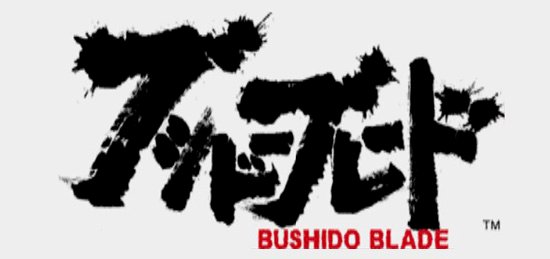
STORY:
Bushido Blade
takes place on an island near the southern mountains of Japan. A five hundred
year old dojo known as Meikyokan lies within this region, and teaches the
disciplines of the master Narukagami Shinto. A society of assassins known as
Kage also resides within the dojo. Once led by the honorable swordsman Utsusemi,
he lost his position to Hanzaki, another skilled member of the dojo, in a fierce
battle. Hanzaki gained respect as the Kage leader, until he discovered a cursed
sword known as Yugiri. He began to change, disregarding the groups honor and the
traditions held by its students.
One day, a Kage escapes the confines of the
dojo with its secrets. Several other members of the society, under penalty of
death, are sent to dispatch the defector, only catching up to him (or her)
within the ruins of the surrounding Yin and Yang Labyrinth Castle. The player
takes on the role of the escaped assassin, fighting his or her way out by
killing comrades one by one. The game story differs with each character
selected.
|
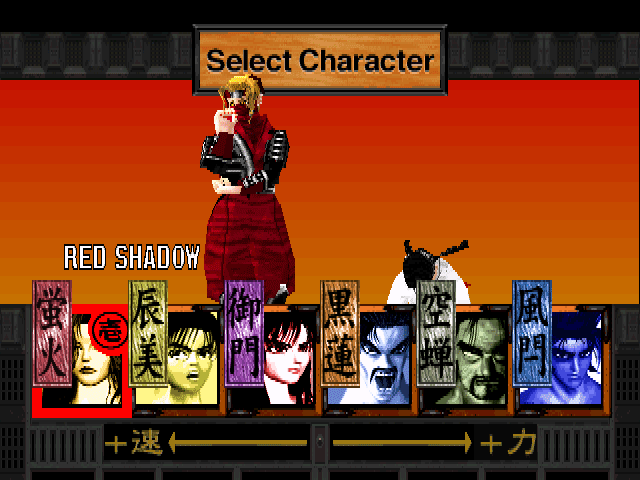
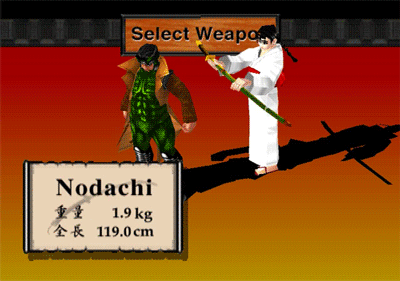
|
|
Actually one of PS1's
better fighting games in 1997-1998.
|
REVIEW:
Bushido
Blade introduced a fresh concept to the 3D
fighting game genre, offering a "realistic" approach to weapon based
combat. Square decided to completely do away with a staple of nearly all fighting
games - Life Bars. That means, with one good slash of a katana, a fight
could be won. This concept definitely brings along some unorthodox gameplay, but one can't argue that it makes
sense considering we're dealing with legit samurai and live blades in the mix. 
|
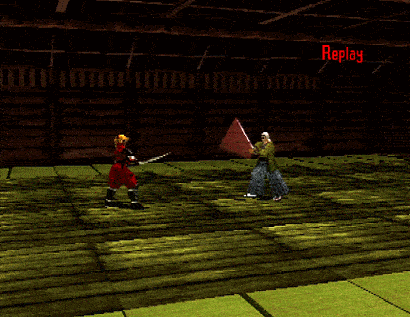
|
|
Select your
weapon. . . You've got options!
|
Another original idea that Bushido Blade
introduced is the ability for all characters
to use all 8 weapons featured in the game. The selectable weapons
are as follows: katana, nodachi, long sword,
saber, naginata, rapier, broadsword, & sledgehammer. Each character also has
3 different stances (high, mid, and low) where several different attacks can be
thrown from (sometimes differing slightly from character to character).
Furthermore, some attacks can only be done with specific character
and weapon combinations! A cool element in terms of gameplay... and fun for new
players to discover. The building blocks of any great fighting game, right?
While this was more exaggerated in fighting games to come... sadly, Bushido
Blade suffers from many characters sharing the exact same moves and animations.
That said, the visual stimulation of the animation can quickly get repetitive to
watch.
|
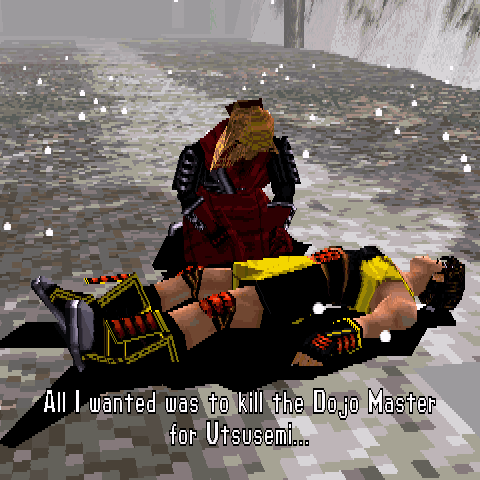
|
|
Dramatic
story mode scenes... Presentation!
|
One of Bushido Blade's most distinctive
elements is the game's incorporation of the Japanese honor code of Bushido.
During the game's innovative Story mode, players are encouraged to battle honorably by adhering to
certain rules within combat. Actions such as "attacking from behind" will
result in an
automatic game over (after some battles)... no cheap shots allowed!
This gives the player a unique purpose and direction when thrown into battle. Cool
idea, right!?
Bushido Blade's gameplay also features free-running (360 degrees) around the 3D
environment... yes, environment. There aren't really any "stages"
in Bushido Blade. Instead, combatants fight it out in a landscape
featuring various paths which open new areas. Basically, if you
don't feel like fighting your opponent
in your current location, you can always run away and fight somewhere else!
(It's pretty fun in 1-player mode).  The free-running element is quite entertaining for a while, and even adds quite
a bit of strategy to the game as well... those over-the-shoulder /
behind-the-back running slashes are damn effective (but are strongly against the
code of Bushido). Heh. The environments
are also compellingly interactive, with bamboo trees you can cut down, higher places to climb onto,
and more. "Discovery" is a unique aspect of Bushido Blade that
some other fighting games don't really dive into so much.
The free-running element is quite entertaining for a while, and even adds quite
a bit of strategy to the game as well... those over-the-shoulder /
behind-the-back running slashes are damn effective (but are strongly against the
code of Bushido). Heh. The environments
are also compellingly interactive, with bamboo trees you can cut down, higher places to climb onto,
and more. "Discovery" is a unique aspect of Bushido Blade that
some other fighting games don't really dive into so much.
|
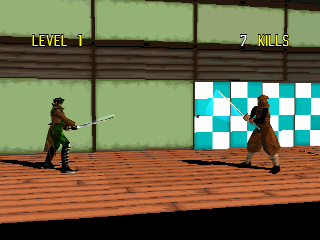
|
|
Survival mode was crack.
Absolute crack.
|
In addition to Bushido Blade's single player Story mode, the contains a
2-Player Versus Mode, Practice Mode, and a pretty interesting
"First-Person Vs. Mode" which can be enjoyed with two local players by using
two TV sets. Also
included is a cool 1-player bonus mode called "Slash Mode" —
pitting the player against up to 100 enemies,
one after another. As cool as Story mode is, I personally enjoyed this
particular mode just as much, if not more than
the other main modes of the game. This "Survival"-like mode was a
perfect way to get good at the game and become a master of it's mechanics,
making all other modes easier.  While some aspects of Bushido Blade get repetitive... the "ouch factor"
kept me playing and enjoying a variety of cool-looking death animations,
with solid visual collision detection where it counts.
While some aspects of Bushido Blade get repetitive... the "ouch factor"
kept me playing and enjoying a variety of cool-looking death animations,
with solid visual collision detection where it counts.
|

|
|
The
innovative first-person mode.
|
For a 1996 fighting game exclusive to PlayStation, which received a fair amount of buzz
around it when it launched, you can't really ask for much more. Bushido Blade is a gem. However,
there are some flaws worth pointing out. The biggest flaw
of Bushido Blade might be the graphics. The environments, though
generally "pretty" and immersive for the time, do appear very
pixilated (and hurt the eyes a bit). The
in-game blood also looks more like pixilated fireworks, or confetti than it does
blood. The effect adds a fair share of quirkiness to the seriousness of the
battle. Secondly, the animation has its moments of resembling authentic Japanese
swordsmanship... but there are quirky imperfect moments, like characters jumping
with straight legs (similar to Mortal Kombat games).
Another potential "flaw" worth mentioning — there are only 6 main
playable characters, giving the entire game a
"lonely" feeling. On the bright side, there is one unlockable character
available in Versus mode.., and 5 non-playable hidden characters than can be encountered in the main 1-player
mode (or perhaps later accessed with game hack devices). Two of
these cpu-only characters only reveal themselves if a player can complete the game and achieve the alternative ending.
(To do this, you
must select the appropriate character and also the following: #1
Do not take any damage, #2 Reach the well before the fourth battle, and #3
do not break the Bushido Code.) For players just wanting to just jump in mashing
buttons and killing everything that moves, it's a big ask. The game requiring
"Bushido" rules perfectly fits the title and is a unique aspect, but
this might frustrate some potential players early on. I for one give
the designers credit for their artistic direction and boldness to try something
new in the fighting genre.
|
|

| Page Updated: |
November
23rd, 2024 |
| Developer(s): |
Squaresoft
/ Lightweight |
| Publisher(s): |
Square Co. 
SCEA  |
| Designer(s): |
Tetsuo Mizuno |
| Platform(s): |
PlayStation
|
| Release Date(s): |
Mar. 14th, 1997

Sept. 30th, 1997 
Feb. 1st,
1998  |
| Characters: |
Kannuki,
Mikado,
Tatsumi,
Red
Shadow, Black Lotus, Utsusemi,
Katze
|
| Non-Playable
Characters: |
Hokkyoku
Tsubame, Sanzaka, Takeru
Hongou, Hanzaki,
Kindachi |
|
|
|
Featured Video:
|
|
|
| Related Games: |
Bushido Blade 2, Soul Blade,
Soul Calibur,
Battle Arena Toshinden 2, Battle
Arena Toshinden 3, Last Bronx, Star Gladiator,
Star Wars: Masters of Teras Kasi, Mace:
The Dark Age, Last Bronx, Fighters
Megamix, Bloody Roar, Mortal
Kombat 4, TEKKEN 3,
Golden Axe: The Duel |
|

|
|
Gameplay
Engine
|
8.0 / 10
|
|
Story
/ Theme
|
7.5 / 10
|
|
Overall
Graphics
|
6.5 / 10
|
|
Animation
|
7.0 / 10
|
|
Music
/ Sound Effects
|
7.5 / 10
|
|
Innovation
|
9.0 / 10
|
|
Art Direction
|
8.0 / 10
|
|
Customization
|
8.5 / 10
|
|
Options / Extras
|
7.0 / 10
|
|
Intro / Presentation
|
6.0 / 10
|
|
Replayability / Fun
|
7.5 / 10
|
|
"Ouch" Factor
|
7.5 / 10
|
|
Characters
|
6.5 / 10
|
|
BOTTOM LINE
|
7.8
/
10
|
|
|
|
| Final
Words: |
Bushido Blade was an innovative and classy weapon-based fighting game on PS1. I was happy to have his title in my PS1 library and (surprisingly) put many
hours into it. The free running mechanic, unique "1-hit-kill" gameplay element, open 3D environments, and characters who can use all of the different weapons made this game stand out!
Considering Bushido Blade's competition in the fighting genre in 1997, the game still left some things to be desired in certain areas... specifically
graphics, character designs, story, and overall content. (Thankfully, the sequel Bushido
Blade 2 improved upon those aspects!) The animation quality has its iffy moments, but for the most part - Bushido Blade game has decent ouch factor. The ultra-pixilated blood is also hilarious but gives the game that iconic PS1-era charm. 
While not necessarily designed to be taken too
seriously as a "competitive" fighting game, Bushido Blade's highly unique gameplay was solid enough and a fun new take on the idea of what a fighting game could be. If you could get past the outdated graphics and blocky (yet charming) PS1-era polygons, Bushido Blade offers a truly unique gameplay experience that no fighting game
player or samurai fan should miss out on.
~TFG
Webmaster | @Fighters_Gen
|
|
|
|
|
|
|
|
|
|
|
|
|
|
|
|
|